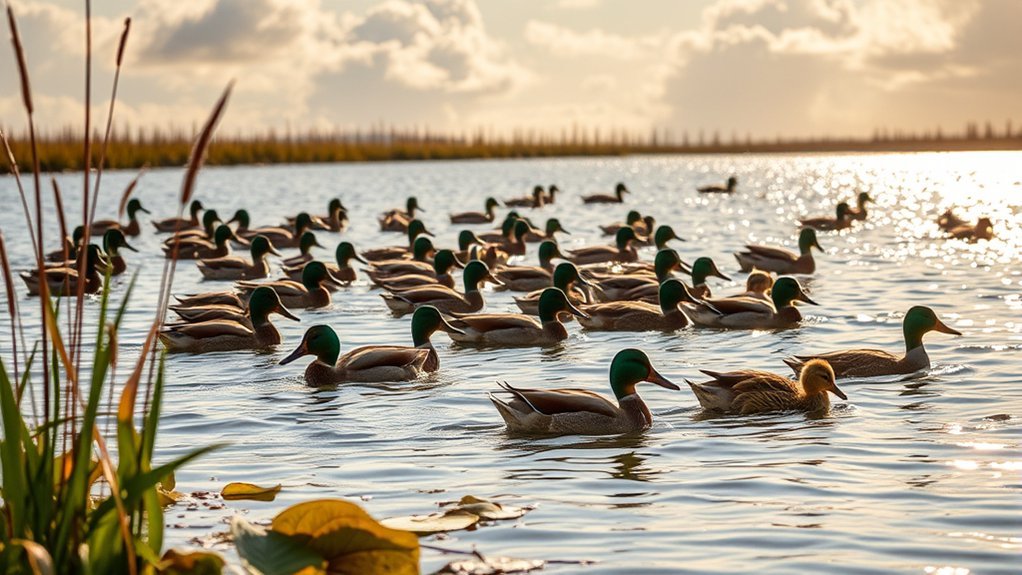Ducks of South Carolina: A Complete Overview
South Carolina is home to many kinds of ducks, with the Mallard and Wood Duck being two of the most common. These ducks love wetlands and lakes where they find food and places to live. They migrate to different areas when the seasons change and build nests in safe spots.
But ducks face some challenges. Habitat loss and pollution can harm their environments. People are working hard to help protect these birds and their homes. Understanding their habits helps us appreciate how important they are to nature. By learning more about them, we can support efforts to keep them safe for the future.
A Quick Overview
South Carolina has many types of ducks, like the common mallard and the bright wood duck. Ducks live happily in wetlands, swamps, rivers, and lakes. These places give them food and a place to stay.
In the fall, migratory ducks come to South Carolina. They change what they eat in the winter. When spring arrives, they return to nest and raise their young.
If you want to watch ducks, great spots include Lake Moultrie and Santee National Wildlife Refuge. The best times to see them are early in the morning and late in the afternoon.
Conservation efforts help protect duck homes and keep track of their numbers. This way, ducks can continue to thrive in South Carolina for everyone to enjoy.
Common Duck Species in South Carolina

In South Carolina, you can see many different types of ducks in wetlands and lakes. To spot them, look at their colors, sizes, and special markings. This can help you tell them apart.
One common duck is the mallard. You can recognize it by its bright green head. Another duck you might see is the wood duck, which has beautiful colors and patterns.
These ducks have different ways of eating. Mallards like to dabble, which means they poke their heads under water to find plants. Wood ducks prefer seeds, fruits, and insects. Watching how they feed can help you learn more about them and appreciate the nature around you.
Get outside and enjoy watching these amazing ducks!
Preferred Habitats and Nesting Areas

Ducks in South Carolina like to live in wet areas. These include swamps, marshes, rivers, and lakes. These places are important for ducks because they provide food and safe spots to rest.
When ducks nest, they often look for thick plants near water. This helps keep them safe from predators. Some ducks also like to nest in grassy areas that are close to water. These grasses hide them from view.
Learning where ducks choose to live and nest helps with conservation. It makes us appreciate the many bird species in South Carolina even more.
Migratory Patterns and Seasonal Changes

Ducks in South Carolina have special places where they like to live and find food. These spots help us learn about where they go and what they do during the year.
Ducks usually fly to South Carolina in the fall when it starts to get cold up north. Types like mallards and wood ducks move south to enjoy the warm weather here.
In winter, you can see how ducks change their eating habits. They look for food that's easy to find.
As spring comes, they begin their journey back north to have their babies. Watching ducks during these times helps you appreciate their life and the changing seasons in South Carolina.
It's a great way to connect with nature and understand the patterns of these birds.
Duck Watching Tips and Best Locations
Want to enjoy duck watching in South Carolina? Here are some tips to make your experience better!
First, get a good pair of binoculars. Binoculars help you see the ducks up close, and wide-angle lenses let you spot more at once.
Next, learn a few duck calls. These sounds can attract different duck species, giving you more chances to see them.
Some great places to go duck watching are Lake Moultrie and Santee National Wildlife Refuge. These locations have many types of habitats where ducks like to hang out.
Keep an eye on the weather. Ducks are most active in the early morning and late afternoon. That's the best time to see them!
You can also join a birdwatching group. This is a fun way to meet other people who love watching ducks and share tips.
Conservation Efforts and Protection of Duck Populations
When you watch ducks in South Carolina, remember that many people are working hard to protect them and their homes.
Groups are busy fixing wetlands and natural areas that ducks need to breed and find food. These actions help not just the ducks, but also other animals and plants in the area.
People also keep an eye on duck numbers and their movement patterns. They study how changes in the environment impact ducks.
By connecting with local groups, you can help too. Supporting habitat protection and joining monitoring activities allows you to be part of the effort to keep ducks and nature thriving in South Carolina.
You can enjoy the beauty of these birds while helping ensure they've a bright future!
Frequently Asked Questions
What Are the Best Feeding Practices for Domesticated Ducks?
To keep your ducks healthy, set a regular feeding time. Give them a good mix of grains, vegetables, and proteins. Watch how much they eat and change the amount you give based on their age and how much they move around. This way, they stay happy and healthy!
How Can I Identify Different Duck Breeds?
To identify different duck breeds, start by looking at their size. Some ducks are small, while others are big. Next, check their colors and patterns. Ducks can be brown, white, black, or many other colors.
Listen to how they sound. Each breed has a unique quack or call. Look at their beaks, too. Some have long beaks, and others have shorter ones.
Don't forget to notice their feet! Duck feet can be webbed or have different shapes.
You can use field guides or apps. These tools can help you learn more about each duck breed. This way, you can connect with them and enjoy watching their unique traits!
Are Ducks Social Animals, and Do They Bond With Humans?
Yes, ducks are social animals. They like to be with other ducks and show strong social behaviors. Ducks can also bond with people. When you are kind to them and spend time together, ducks can show affection and trust. This helps them feel happy and makes the connection between you and the duck even better.
What Diseases Commonly Affect Ducks in South Carolina?
Ducks in South Carolina can get sick from diseases like avian influenza and duck plague. To help keep your ducks healthy, you should use simple methods.
First, talk to your vet about getting your ducks vaccinated. This can help prevent diseases.
Next, keep their living area clean. Make sure their habitat is dry and free from waste. This will help stop germs from spreading.
Also, check your ducks often. Look for signs of sickness, like not eating or acting different. If you notice anything unusual, contact a vet right away.
How Long Do Ducks Typically Live in Captivity?
Ducks can live for about 8 to 10 years when they are taken care of in captivity. Good food, enough space, and regular vet visits help them live longer and healthier lives. When ducks feel good, they are happier and can form better relationships with their caretakers. Taking care of ducks can be fun and rewarding!

Luna is the passionate founder and author of Birds and You, a website dedicated to sharing her love for birds with fellow enthusiasts. Through her engaging articles and guides, she aims to educate and inspire others to explore the fascinating world of birds. When she’s not writing, you can find Luna observing birds in their natural habitats or sharing beautiful bird photography on Pinterest. Join her on this journey to celebrate and protect our feathered friends!







